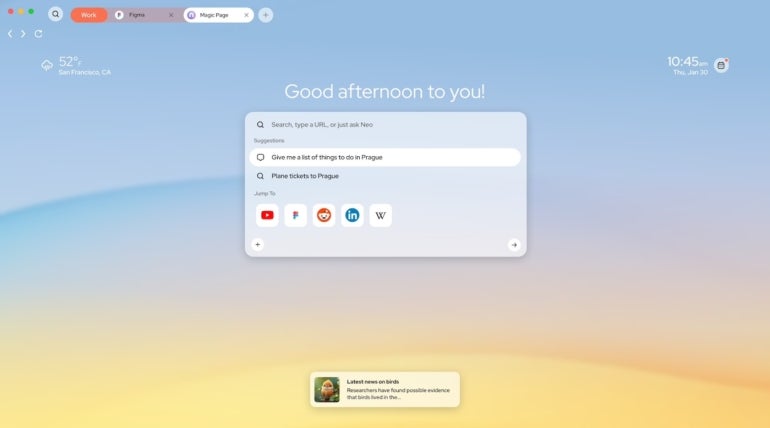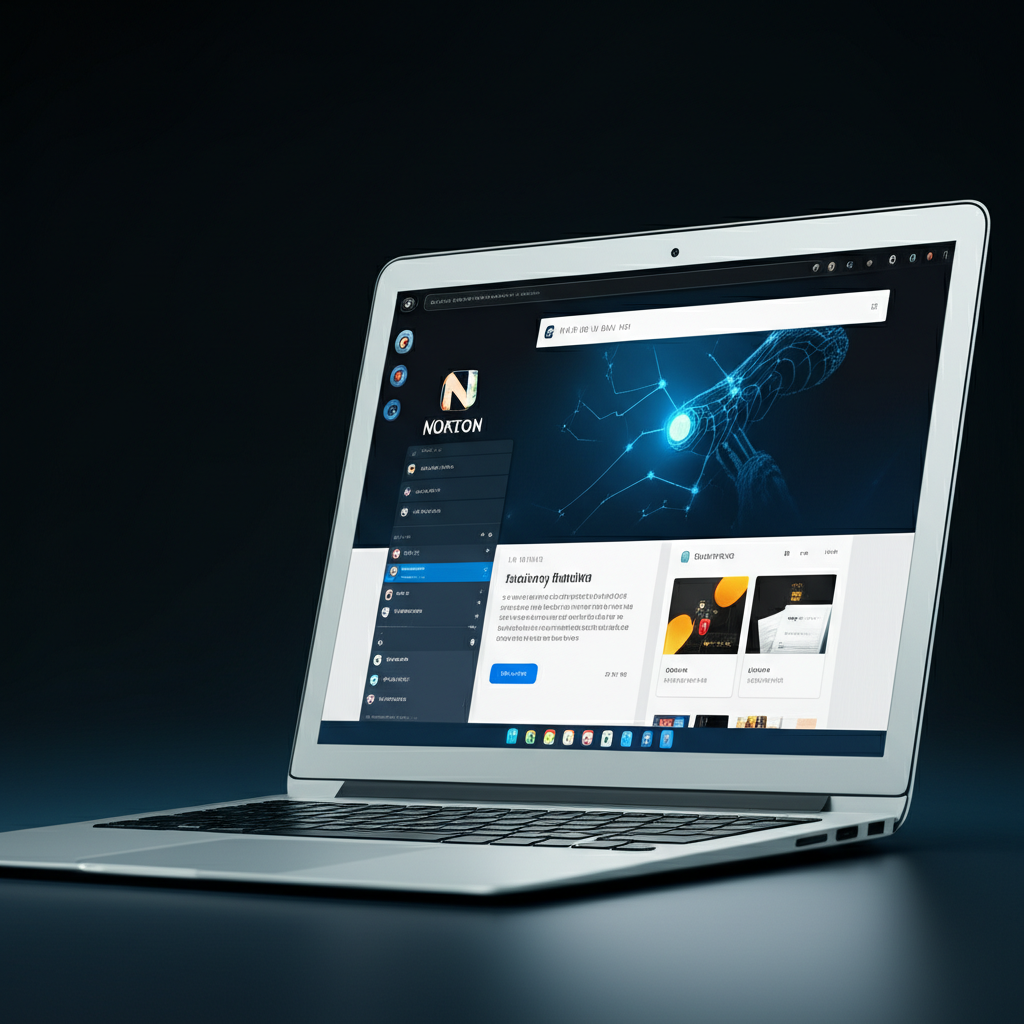Norton Neo: An AI-First Browser Redefining Online Productivity and Security

The digital landscape is in constant flux, driven by rapid advancements in artificial intelligence. As AI models become more sophisticated and integrated into our daily lives, the tools we use to navigate the internet are also evolving. The traditional web browser, long serving as a window to the digital world, is now facing a paradigm shift. The lines between simple search results and AI-generated answers are increasingly blurring, prompting companies to reimagine how we interact with the web.
In this evolving environment, cybersecurity giant Norton, owned by Gen (formerly Symantec), has stepped forward with a bold new offering: Norton Neo. Launched in early access in the US, Neo is not just another browser; it's an AI-first platform designed from the ground up to integrate artificial intelligence deeply into the browsing experience. The company is actively soliciting user feedback during this early phase, signaling a commitment to shaping the browser's development based on real-world usage and needs.
Howie Xu, chief AI and innovation officer at Gen, articulated the vision behind Neo, stating, “Traditional browsers were built for a different era focused on static search and manual organization through tabs, bookmarks and history.” He emphasized that Neo represents a fundamental shift, designed to “flip that dynamic” by working proactively with the user, intelligently curating content and managing tasks to allow individuals to “focus on what really matters.” This perspective highlights a move away from passive information retrieval towards an active, intelligent partnership between the user and their browsing tool.
The Technological Core of Norton Neo
At the heart of Norton Neo's AI capabilities lies a sophisticated technological architecture. The browser operates using a combination of cutting-edge frontier AI models and a proprietary model developed specifically for Neo: the Neo Model from Gen’s AI Lab. This hybrid approach allows Neo to leverage the broad knowledge and capabilities of large, general-purpose AI models while also incorporating specialized functionalities and optimizations provided by Gen's own research.
Data processing in Neo is handled through a combination of cloud-based and local operations. This distributed approach offers flexibility and potentially enhances performance and privacy. Xu indicated that future iterations of Neo plan to offer users more granular control over data processing, including options to rely solely on the Neo model or to process data exclusively locally. Such features could appeal significantly to users with heightened privacy concerns, offering greater transparency and control over how their browsing data is handled.
Boosting Productivity with an Integrated AI Assistant
A primary goal driving the development of Norton Neo is the desire to significantly increase user productivity by eliminating the tedious and repetitive tasks often associated with web browsing. Manually sifting through countless pages of search results, organizing dozens of open tabs, and constantly switching contexts are common frustrations that Neo aims to alleviate.
Central to Neo's interface and user interaction is the 'Magic Box.' This AI-powered chat window serves as the core point of engagement with the browser's intelligent assistant. Unlike traditional search bars or separate AI chatbot interfaces, the Magic Box is designed to be front and center, seamlessly integrated into the browsing flow. The assistant within the Magic Box is engineered to anticipate user needs and proactively streamline the web experience.
The AI assistant functions as a dynamic search engine, capable of understanding and responding to natural language queries. Instead of merely presenting a list of links, it browses the web itself to find and synthesize answers. Users can then examine the source links in a convenient preview window, allowing them to verify the information and delve deeper if needed. This approach aims to provide users with direct answers and curated information, reducing the time spent navigating and evaluating multiple websites.
Beyond search, the AI assistant in Neo is designed to suggest content it deems most relevant based on the user's browsing history and current activity. This proactive content curation aims to bring valuable information to the user without requiring explicit search queries, potentially uncovering useful resources or related topics that might otherwise be missed.
Another key productivity feature is automatic tab organization. The AI assistant can group and manage open tabs intelligently, a capability that goes beyond the manual or rule-based tab management features found in some existing browsers like Microsoft Edge. By leveraging AI, Neo can potentially understand the context and relationship between open tabs, organizing them in a way that aligns with the user's current tasks or projects.
Navigating the Competitive Landscape of AI Browsing
Norton Neo enters a rapidly evolving market where major tech players are also exploring the integration of AI into browsing and search. While AI models like OpenAI's ChatGPT and Google's Gemini can access web search capabilities, they typically exist as separate interfaces or overlays rather than controlling the entire browsing environment. This distinction is crucial.
Microsoft, for instance, introduced its Recall feature (though its rollout faced significant privacy concerns), which aimed to provide users with a searchable history of everything they've seen on their PC, including web pages. Google is also working on deeper integrations, linking its Gemini AI with services like Gmail and Docs, hinting at a future where AI plays a more active role across a user's digital ecosystem. The recent discussions around OpenAI's potential interest in acquiring Google Chrome and transforming it into an "AI-first" browser underscore the industry's focus on this area.
Norton Neo finds a middle ground in this landscape. By embedding the AI assistant directly within the browser, it gains access to the user's browsing context — the open tabs, the content on the current page, the browsing history within Neo — allowing the AI to be more contextually aware and helpful. However, crucially, Neo's AI does not have access to the rest of the user's device or data from other browsers. This scoped access might resonate better with users concerned about the privacy implications of AI having widespread access to their digital lives, offering a balance between enhanced functionality and data control.
The shift towards AI-integrated browsing is also evident in how search itself is changing. Google's CEO Sundar Pichai has described the new Google Search AI Mode as a 'Total Reimagining' of the search experience. This indicates a broader industry trend where AI is moving beyond simply indexing and retrieving information to actively processing, synthesizing, and presenting it in new ways. Neo's approach with the Magic Box and proactive content curation aligns with this trend, offering an alternative interface for interacting with the web's vast information.
Built-in Security and Privacy Features
As a product from Norton, a company synonymous with cybersecurity, Neo naturally incorporates robust security and privacy features directly into the browser. This is a significant differentiator, as users typically rely on browser extensions or separate security software to gain these protections.
Neo includes built-in ad blocking, a feature increasingly sought after by users for both privacy and performance reasons. By blocking intrusive advertisements, the browser can offer a cleaner, faster browsing experience while also mitigating potential vectors for malware or tracking.
Furthermore, Neo integrates an AI-driven URL scanner called Norton WebShield. This technology is designed to proactively detect suspicious website addresses that might lead to phishing attempts, malware downloads, or other online threats. By analyzing URLs in real-time, WebShield aims to warn users before they even reach a dangerous site, adding a crucial layer of defense against common cyberattacks.
Norton's move into the browser space isn't entirely new; the company introduced a privacy-focused browser in 2023. Neo appears to be an evolution of this strategy, combining Norton's established expertise in security with the transformative potential of AI. This integration of security and AI within the browser itself positions Neo as a potentially compelling option for users who prioritize both enhanced productivity and robust online protection.
The Future of Web Interaction
Norton Neo represents a significant step in the evolution of web browsers. By placing an AI assistant at the core of the user experience, it challenges the traditional model of manual navigation and information retrieval. The focus on productivity, proactive content curation, and intelligent task management reflects a growing demand for digital tools that can adapt to and assist users rather than merely serving as passive interfaces.
The early access phase is crucial for Neo's development. User feedback will play a vital role in refining the AI's capabilities, optimizing the interface, and ensuring that the balance between AI assistance, user control, and privacy is appropriately struck. As AI technology continues to advance, browsers like Neo are likely to become more common, fundamentally changing how we search for information, manage our online tasks, and interact with the vast resources of the internet.
The success of Neo will depend on its ability to deliver tangible productivity benefits without compromising user privacy or security. Its integrated security features provide a strong foundation, while the AI assistant's effectiveness in understanding and assisting users will be key to widespread adoption. As the digital world becomes increasingly complex, tools that can intelligently simplify and secure our online interactions, like Norton Neo aims to do, may well define the future of web browsing.
